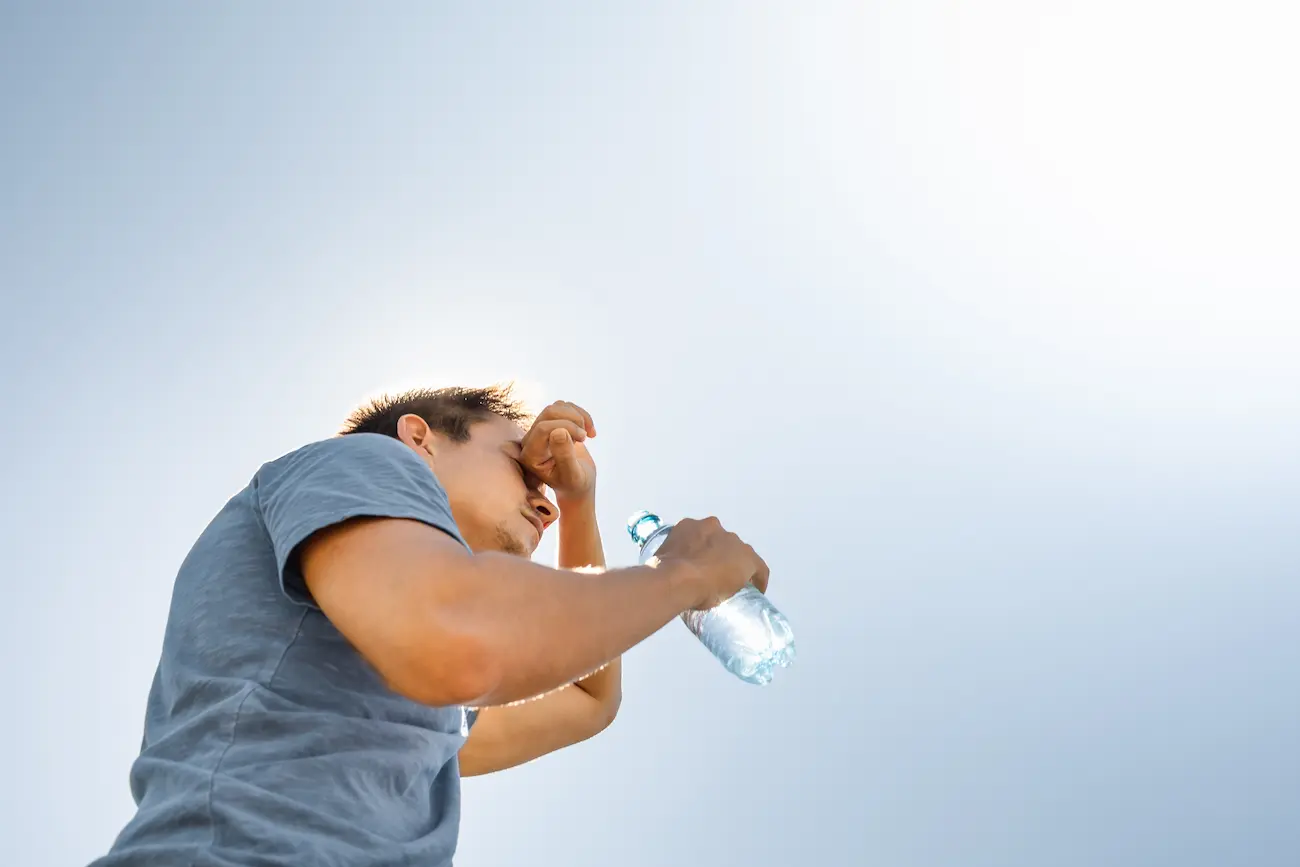Can Dehydration Cause Nausea? Staying Hydrated in Miami

Dehydration, a common concern in sunny Miami, occurs when your body loses more fluids than it takes in. While often associated with thirst and fatigue, dehydration can also lead to a range of other symptoms, including nausea.
If you’re a Miami resident and have ever felt queasy after a long day in the sun or after a bout of intense exercise, you might be wondering, “Can dehydration cause nausea?” Let’s explore this connection, understand the negative effects of dehydration, and learn how to stay properly hydrated in Miami’s tropical climate.
Can Dehydration Cause Nausea? The Body’s Fluid Balance
Yes, dehydration can indeed cause nausea. Your body needs a proper balance of fluids and electrolytes to function optimally. When you become dehydrated, this balance is disrupted, leading to various symptoms, including:
- Nausea and vomiting: Dehydration can affect your digestive system, leading to feelings of nausea and even vomiting.
- Headaches: Dehydration can also trigger headaches, often described as a dull ache or pressure in your head.
- Dizziness and lightheadedness: These symptoms can occur due to reduced blood flow to the brain caused by dehydration.
- Fatigue and weakness: Dehydration can make you feel tired and weak, as your body struggles to function with insufficient fluids.
- Constipation: Lack of fluids can make your stool hard and difficult to pass.
How Long Does It Take to Rehydrate?
The time it takes to rehydrate depends on the severity of your dehydration and how quickly you replenish fluids.
- Mild dehydration: Drinking fluids consistently throughout the day can usually rehydrate you within a few hours.
- Moderate to severe dehydration: Might require oral rehydration solutions or even intravenous (IV) fluids to restore fluid balance more quickly.

How Long Does It Take to Recover from Dehydration?
Recovery from dehydration also depends on its severity and your overall health.
- Mild cases: You might feel better within a few hours of rehydrating.
- More severe cases: It could take a day or two to fully recover, especially if you’ve experienced significant fluid and electrolyte loss.
Dehydrated Water: A Common Misconception
The term “dehydrated water” is a bit of a misnomer. Water itself cannot be dehydrated, as it’s already in its purest form. However, the term is sometimes used to refer to water that has had minerals or electrolytes removed, such as distilled water.
For optimal hydration, it’s best to choose mineral-rich water or add electrolytes to your water if you’re sweating excessively or experiencing dehydration.
When to Seek Medical Attention in Miami
If you experience severe dehydration symptoms like confusion, rapid heartbeat, or fainting, seek immediate medical attention.
For ongoing concerns about dehydration or its underlying causes, schedule an appointment with a primary care doctor or primary care in Miami. They can assess your health, provide personalized advice on hydration, and address any underlying medical conditions that might be contributing to your dehydration.
Key Takeaways:
- Dehydration can cause nausea, headaches, dizziness, fatigue, and other symptoms.
- Rehydration time varies depending on the severity of dehydration.
- Choose mineral-rich water or add electrolytes for optimal hydration.
- If you experience severe dehydration symptoms or have ongoing concerns, consult a primary care doctor in Miami.
Remember, staying hydrated is crucial for your health and well-being, especially in Miami’s warm climate. By understanding the signs of dehydration and taking proactive steps to replenish fluids, you can maintain optimal health and enjoy all that Miami has to offer.
Disclaimer: This article is intended for informational purposes only and should not be considered a substitute for professional medical advice. If you have any concerns about your health or are experiencing dehydration, consult a qualified healthcare professional.
FAQs: Can Dehydration Cause Nausea?
- How can I tell if I’m dehydrated? Besides thirst, look for signs like dark yellow urine, dry mouth and skin, fatigue, headache, and dizziness. In more severe cases, you might experience rapid heartbeat, confusion, or fainting.
- What’s the best way to rehydrate quickly in Miami’s hot weather? Drinking plenty of water is essential. You can also opt for electrolyte drinks or coconut water to replenish lost minerals. If you’re engaging in strenuous activities or spending prolonged periods outdoors, consider increasing your fluid intake to prevent dehydration.
- Can certain medical conditions make me more prone to dehydration? Yes, conditions like diabetes, kidney disease, and digestive disorders can increase your risk of dehydration. If you have any underlying health concerns, talk to your doctor about strategies to stay adequately hydrated.
- I’m experiencing nausea and vomiting. How can I prevent dehydration? If you’re unable to keep fluids down due to nausea and vomiting, it’s crucial to seek medical attention promptly. In the meantime, try sipping small amounts of clear liquids like water or broth frequently.
- I’m concerned about dehydration and its impact on my health. Can I schedule an appointment with a primary care doctor in Miami? Absolutely! Hiriart & Lopez MD in Miami offers comprehensive primary care services. Our doctors can assess your health, provide personalized advice on hydration, and address any underlying medical conditions that might be contributing to your dehydration.
Contact Us
Hiriart & Lopez MD, LLC
9950 SW 107th Ave STE 101,
Miami, FL 33176
305-274-8779
Phone: (305) 274-8779
Fax: (305) 274-0646
OPENING HOURS
Monday 7:30 AM–4:30 PM
Tuesday 7:30 AM–4:30 PM
Wednesday 7:30 AM–4:30 PM
Thursday 7:30 AM–4:30 PM
Friday 7:30–11 AM
Saturday Closed
Sunday Closed
OFFICE LOCATION
Can Dehydration Cause Nausea? Staying Hydrated in Miami

Dehydration, a common concern in sunny Miami, occurs when your body loses more fluids than it takes in. While often associated with thirst and fatigue, dehydration can also lead to a range of other symptoms, including nausea.
If you’re a Miami resident and have ever felt queasy after a long day in the sun or after a bout of intense exercise, you might be wondering, “Can dehydration cause nausea?” Let’s explore this connection, understand the negative effects of dehydration, and learn how to stay properly hydrated in Miami’s tropical climate.
Can Dehydration Cause Nausea? The Body’s Fluid Balance
Yes, dehydration can indeed cause nausea. Your body needs a proper balance of fluids and electrolytes to function optimally. When you become dehydrated, this balance is disrupted, leading to various symptoms, including:
- Nausea and vomiting: Dehydration can affect your digestive system, leading to feelings of nausea and even vomiting.
- Headaches: Dehydration can also trigger headaches, often described as a dull ache or pressure in your head.
- Dizziness and lightheadedness: These symptoms can occur due to reduced blood flow to the brain caused by dehydration.
- Fatigue and weakness: Dehydration can make you feel tired and weak, as your body struggles to function with insufficient fluids.
- Constipation: Lack of fluids can make your stool hard and difficult to pass.
How Long Does It Take to Rehydrate?
The time it takes to rehydrate depends on the severity of your dehydration and how quickly you replenish fluids.
- Mild dehydration: Drinking fluids consistently throughout the day can usually rehydrate you within a few hours.
- Moderate to severe dehydration: Might require oral rehydration solutions or even intravenous (IV) fluids to restore fluid balance more quickly.

How Long Does It Take to Recover from Dehydration?
Recovery from dehydration also depends on its severity and your overall health.
- Mild cases: You might feel better within a few hours of rehydrating.
- More severe cases: It could take a day or two to fully recover, especially if you’ve experienced significant fluid and electrolyte loss.
Dehydrated Water: A Common Misconception
The term “dehydrated water” is a bit of a misnomer. Water itself cannot be dehydrated, as it’s already in its purest form. However, the term is sometimes used to refer to water that has had minerals or electrolytes removed, such as distilled water.
For optimal hydration, it’s best to choose mineral-rich water or add electrolytes to your water if you’re sweating excessively or experiencing dehydration.
When to Seek Medical Attention in Miami
If you experience severe dehydration symptoms like confusion, rapid heartbeat, or fainting, seek immediate medical attention.
For ongoing concerns about dehydration or its underlying causes, schedule an appointment with a primary care doctor or primary care in Miami. They can assess your health, provide personalized advice on hydration, and address any underlying medical conditions that might be contributing to your dehydration.
Key Takeaways:
- Dehydration can cause nausea, headaches, dizziness, fatigue, and other symptoms.
- Rehydration time varies depending on the severity of dehydration.
- Choose mineral-rich water or add electrolytes for optimal hydration.
- If you experience severe dehydration symptoms or have ongoing concerns, consult a primary care doctor in Miami.
Remember, staying hydrated is crucial for your health and well-being, especially in Miami’s warm climate. By understanding the signs of dehydration and taking proactive steps to replenish fluids, you can maintain optimal health and enjoy all that Miami has to offer.
Disclaimer: This article is intended for informational purposes only and should not be considered a substitute for professional medical advice. If you have any concerns about your health or are experiencing dehydration, consult a qualified healthcare professional.
FAQs: Can Dehydration Cause Nausea?
- How can I tell if I’m dehydrated? Besides thirst, look for signs like dark yellow urine, dry mouth and skin, fatigue, headache, and dizziness. In more severe cases, you might experience rapid heartbeat, confusion, or fainting.
- What’s the best way to rehydrate quickly in Miami’s hot weather? Drinking plenty of water is essential. You can also opt for electrolyte drinks or coconut water to replenish lost minerals. If you’re engaging in strenuous activities or spending prolonged periods outdoors, consider increasing your fluid intake to prevent dehydration.
- Can certain medical conditions make me more prone to dehydration? Yes, conditions like diabetes, kidney disease, and digestive disorders can increase your risk of dehydration. If you have any underlying health concerns, talk to your doctor about strategies to stay adequately hydrated.
- I’m experiencing nausea and vomiting. How can I prevent dehydration? If you’re unable to keep fluids down due to nausea and vomiting, it’s crucial to seek medical attention promptly. In the meantime, try sipping small amounts of clear liquids like water or broth frequently.
- I’m concerned about dehydration and its impact on my health. Can I schedule an appointment with a primary care doctor in Miami? Absolutely! Hiriart & Lopez MD in Miami offers comprehensive primary care services. Our doctors can assess your health, provide personalized advice on hydration, and address any underlying medical conditions that might be contributing to your dehydration.
Contact Us
Hiriart & Lopez MD, LLC
9950 SW 107th Ave STE 101,
Miami, FL 33176
305-274-8779
Phone: (305) 274-8779
Fax: (305) 274-0646
OPENING HOURS
Monday 7:30 AM–4:30 PM
Tuesday 7:30 AM–4:30 PM
Wednesday 7:30 AM–4:30 PM
Thursday 7:30 AM–4:30 PM
Friday 7:30–11 AM
Saturday Closed
Sunday Closed

